新目标英语八年级下册复习提纲unit1-5
英语人教版新目标八年级下册知识整理Unit5

【英语】八年级下册教材全梳理(Unit5 If you go to the party you’ll have a great time)知识·巧学生词巧解【词析】音析:字母组合ea读作[]。
义析:a kind of trousers【典句】This pair of jeans is in style.这条牛仔裤很时髦。
【拓展】jeans本身是复数名词,作主语时谓语动词要用复数形式。
take away拿走【词析】形析:take(拿)+away(离开)义析:take sth.from one place to another【典句】Don’t forget to take away your umbrella.别忘了带走你的雨伞。
【拓展】away是副词,当宾语为代词宾格时,一定要放在away的前面。
make a living 谋生【词析】形析:make(做)+a(一种)+living(生活)义析:do sth.for a living【典句】He makes a living as a writer.他靠写作维持生计。
【拓展】使用时,如果说明谋生的手段应在living后加介词by+doing的结构,指“以……为生”。
如:He makes a living by selling books.他以卖书为生。
【词析】音析:a读[],ai读作[e],重音在第二个音节上。
形析:again(又;再次)+st义析:in a direction or course opposite to【典句】We boated against the wind.我们逆风行船。
【拓展】against本身是介词,不能单独作谓语,常和系动词be连用,意为“反对”。
【词析】音析:ch读作[],an读作[],词尾的e不发音。
形析:形近词change(选择)义析:something that happen unusually and luckily【典句】I haven’t had a chance to read my letter.我还没有机会看我的信呢。
人教新目标八年级英语下册Unit5知识点复习练习
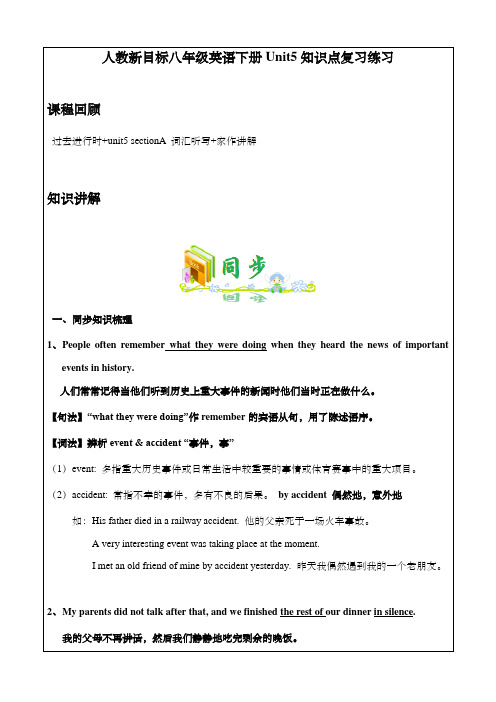
人教新目标八年级英语下册Unit5知识点复习练习课程回顾过去进行时+unit5 sectionA 词汇听写+家作讲解知识讲解一、同步知识梳理1、People often remember what they were doing when they heard the news of importantevents in history.人们常常记得当他们听到历史上重大事件的新闻时他们当时正在做什么。
【句法】“what they were doing”作remember的宾语从句,用了陈述语序。
【词法】辨析event & accident “事件,事”(1)event: 多指重大历史事件或日常生活中较重要的事情或体育赛事中的重大项目。
(2)accident: 常指不幸的事件,多有不良的后果。
by accident 偶然地,意外地如:His father died in a railway accident. 他的父亲死于一场火车事故。
A very interesting event was taking place at the moment.I met an old friend of mine by accident yesterday. 昨天我偶然遇到我的一个老朋友。
2、My parents did not talk after that, and we finished the rest of our dinner in silence.我的父母不再讲话,然后我们静静地吃完剩余的晚饭。
mean to do sth. “打算或企图做某事”如:What do you mean to do with it? 你打算把它怎么处理?What do/did you mean by …? 句型的意思是“你……是什么意思?”如:What do you mean by acting like this? 你这样做是什么意思。
新目标复习课件八年级下unit1-5

see sb. to... = can much at = a lot more多得多 much = doing sth.看见某人正在做某事的一个片段 be able a lot许多 能够…… more least最少
seem weekends在周末 so + adj.十分…… at/on to do sth.好象干某事on weekdays = the week工作日 none of没有一个 in future sth.尽量干某事 try to do = from now on今后try doing sth.尝试干某事 make mistakes犯错误
一 般 将 来 时
形式: will/shall + V原 缩写形式:I’ll they’ll she’ll it’ll will be + N.或Adj. 否定形式:will not=won’t will not be = won’t be I’ll think it over . 我想一想. We’ll only stay for two weeks.我们只待两个星期. He won’t be a successful player in the future. 标志性的词或词组: in+ 一段时间 , tomorrow , in the future next year,
Will people have robots?
come more?更有,甚至 a piece of... 一张 what'sfuture 在将来 in theture实现 see sb. do sth.看见某人做某事的全过程 dress sb.打扮某人 hundreds of好几百 dress up穿衣,打扮 in…year ……年之后
八年级下册英语1--5单元复习提纲

示例 The book fell off the shelf. 这本书从架子上掉了下来。 用法 fall用作动词时,主要有两种用法。一种是作为实义动词,可以和介词或 副词搭配,表示“落下;跌落”,例如:I fell back in my chair. 我跌坐到自己 的椅子上。另一种是作为系动词,与形容词连用,表示进入某种状态, 如:fall asleep 入睡(进入睡眠的状态)。fall的动词过去式是fallen。fall用 作名词时,表示“落下;降低”,例如:I sat listening to the fall of the rain on the roof. 我坐着听雨点落在屋檐上的声音。fall还可以表示“秋天”,与 autumn意思相同。 词汇扩展 常用搭配:fall asleep 入睡fall behind 落后于(某人或某物)fall down 跌落 fall in love with 喜爱;爱上fall off 掉下 fall over 跌落;被绊倒 谚语:He who does not advance falls backward. 不进则退。
词汇拓展 常用搭配:let / leave somebody / something alone 不干涉某人或某物;听其 自然 et alone 不管;不必考虑 谚语:An evil chance seldom comes alone. 祸不单行 3. dress v. put clothes on yourself or someone else 穿衣 示例 Is she old enough to dress herself yet? 她会自己穿衣服了吗? 用法 dress还可以用作名词,表示“女服;连衣裙;服装”。例如:Mary wore a long red dress last evening. 玛丽昨晚穿了件红色的连衣长裙。 辨析dress,put on 和wear: (1)用作动词时,dress既可以表动作,也可以表状态,常用人作宾 语,意思是“……穿衣服”,例如:She is only a girl of three. She can't dress herself. 她只是一个三岁的女孩,她还不能自己穿衣服。需要注意的是, 在表示“给自己穿衣”时,我们通常说dress oneself (= get dressed);当dress表 示状态时,一般要用be dressed in 结构,例如:She was dressed in a red coat. 她穿着一件红色的上衣。 (2)put on 意思是“穿(戴)上”,强调动作。例如:He put on his coat and went out. 他穿上大衣就出去了。 (3)wear意思是“穿(戴)着”,强调状态。例如:Lucy's mother often wears a pair of glasses. 露西的母亲常常戴着一副眼镜。 词汇扩展 常用搭配:dress (somebody) up (in something / as somebody or something) 化妆 打扮 谚语:Eat to please myself, but dress to please others. 吃是使自己受用,穿是 使别人受用。
2020年春人教新目标英语八年级下册Unit5-基础知识
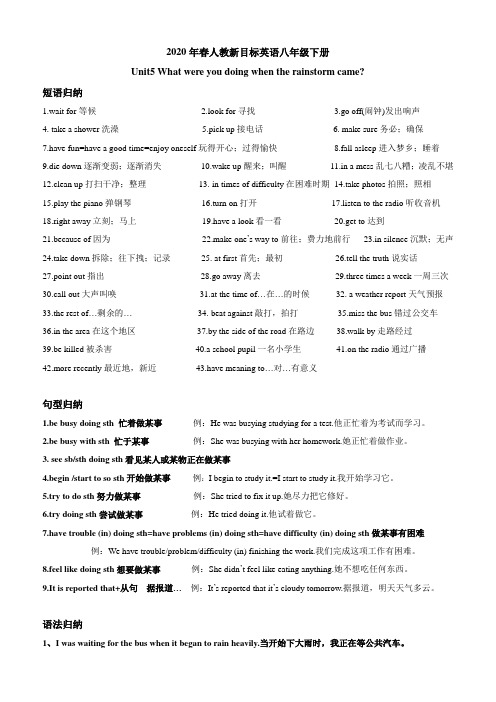
2020年春人教新目标英语八年级下册Unit5 What were you doing when the rainstorm came?短语归纳1.wait for等候2.look for寻找3.go off(闹钟)发出响声4. take a shower洗澡5.pick up接电话6. make sure务必;确保7.have fun=have a good time=enjoy oneself玩得开心;过得愉快8.fall asleep进入梦乡;睡着9.die down逐渐变弱;逐渐消失10.wake up醒来;叫醒11.in a mess乱七八糟;凌乱不堪12.clean up打扫干净;整理13. in times of difficulty在困难时期14.take photos拍照;照相15.play the piano弹钢琴16.turn on打开17.listen to the radio听收音机18.right away立刻;马上19.have a look看一看20.get to达到21.because of因为22.make one’s way to前往;费力地前行23.in silence沉默;无声24.take down拆除;往下拽;记录25. at first首先;最初26.tell the truth说实话27.point out指出28.go away离去29.three times a week一周三次30.call out大声叫唤31.at the time of…在…的时候32. a weather report天气预报33.the rest of…剩余的…34. beat against敲打,拍打35.miss the bus错过公交车36.in the area在这个地区37.by the side of the road在路边38.walk by走路经过39.be killed被杀害40.a school pupil一名小学生41.on the radio通过广播42.more recently最近地,新近43.have meaning to…对…有意义句型归纳1.be busy doing sth 忙着做某事例:He was busying studying for a test.他正忙着为考试而学习。
新目标英语八年级Go for it下册1-5单元 (Units 1-5课文 翻译)
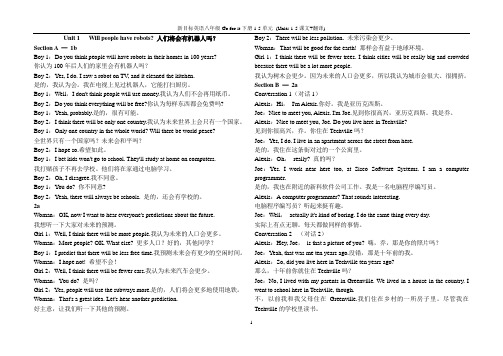
Unit 1 Will people have robots? 人们将会有机器人吗?Section A —1bBoy 1:Do you think people will have robots in their homes in 100 years?你认为100年后人们的家里会有机器人吗?Boy 2:Yes, I do. I saw a robot on TV, and it cleaned the kitchen.是的,我认为会。
我在电视上见过机器人,它能打扫厨房。
Boy 1:Well,I don't think people will use money.我认为人们不会再用纸币。
Boy 2:Do you think everything will be free?你认为每样东西都会免费吗?Boy 1:Yeah, probably.是的,很有可能。
Boy 2:I think there will be only one country.我认为未来世界上会只有一个国家。
Boy 1:Only one country in the whole world? Will there be world peace?全世界只有一个国家吗?未来会和平吗?Boy 2:I hope so.希望如此。
Boy 1:I bet kids won't go to school. They'll study at home on computers.我打赌孩子不再去学校。
他们将在家通过电脑学习。
Boy 2:Oh, I disagree.我不同意。
Boy 1:You do? 你不同意?Boy 2:Yeah, there will always be schools. 是的,还会有学校的。
2aWoman:OK, now I want to hear everyone's predictions about the future.我想听一下大家对未来的预测。
新目标(人教)八年级下册英语单元复习课件 unit 5 复习课件
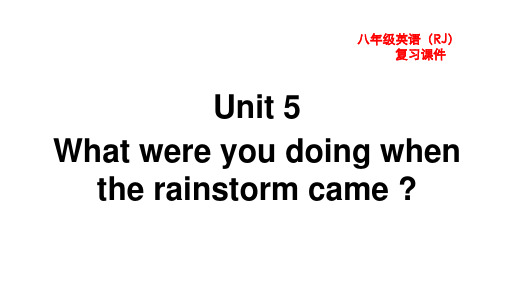
21. 向外看 _b__y_t_h__e__s_id__e of the road
the rest of
look out of
三、核心句型
1.本的爸爸正把一块块木头钉到窗户上,同时他的妈妈在确认手电
筒和收音机都能正常使用。
Ben's dad _w_a__s__ _p_u_t_t_i_n_g_ pieces of wood _o__v_e_r__ the windows _ww_e_h_rie_l_ew_ ohriskimngo.m _w_a__s _m__a_k_i_n_g_ _s_u__re___ the flashlights and radio 2. 暴风雨来的时候你在干什么? What ______ you ________ ________ the rainstorm came?
after that. so scared that
hardly think clearly
6.当校篮球赛开始时,凯特还在去学校的路上。
_W__h__e_n___ the school basketball competition started, Kate ______ still _________ ________ ________ to school. 7.那件事w后as我很难m清a楚ki地ng思考h,er因为我w非a常y 害怕。 I ______ __________ _________ clearly after that because I was very afraid.
【易混辨析】beat与win
beat
意为“打败”,指在游戏或比赛中击败对手,其宾语是比赛或竞 争的对手,如球队、人等。
win
意为“获胜;赢;赢得”,指在竞赛或战争中获得胜利,其宾语 多为表示比赛、战争、奖品、金钱或奖牌等。
八年级下册英语人教版期末单元基础知识点复习unit 1
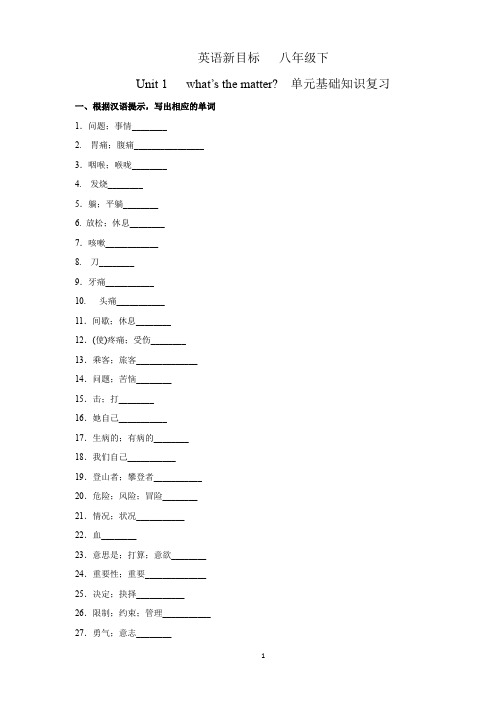
英语新目标八年级下Unit 1 what’s the matter? 单元基础知识复习一、根据汉语提示,写出相应的单词1.问题;事情________2. 胃痛;腹痛________________3.咽喉;喉咙________4. 发烧________5.躺;平躺________6. 放松;休息________7.咳嗽____________8. 刀________9.牙痛___________10. 头痛___________11.间歇;休息________12.(使)疼痛;受伤________13.乘客;旅客______________14.问题;苦恼________15.击;打________16.她自己___________17.生病的;有病的________18.我们自己___________19.登山者;攀登者___________20.危险;风险;冒险________21.情况;状况___________22.血________23.意思是;打算;意欲________24.重要性;重要______________25.决定;抉择___________26.限制;约束;管理___________27.勇气;意志________28.死;死亡________二、单元语法情态动词shouldshould属情态动词, 后接动词原形, 没有人称和数的变化。
用于提出建议劝告别人。
should的否定形式为should not, 通常缩写为shouldn’t。
1. — Tom, I have a toothache. 汤姆, 我牙痛。
— You should see a dentist. 你应当去看牙医。
2. — I’m not feeling well these days. I have bad cough. 这些天我身体不适, 老是咳嗽。
— You shouldn’t smoke so much, I think. 我认为你不该抽这么多烟。
2013新版新目标英语八年级(下)Unit1-5
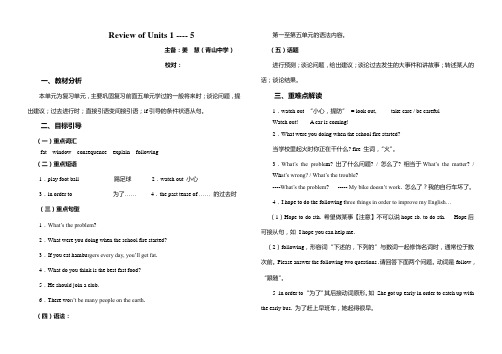
Review of Units 1 ---- 5主备:姜慧(青山中学)校对:一、教材分析本单元为复习单元,主要巩固复习前面五单元学过的一般将来时;谈论问题,提出建议;过去进行时;直接引语变间接引语;if引导的条件状语从句。
二、目标引导(一)重点词汇fat window consequence explain following(二)重点短语1.play foot ball 踢足球2.watch out 小心3.in order to 为了…… 4.the past tense of ……的过去时(三)重点句型1.What’s the problem?2.What were you doing when the school fire started?3.If you eat hambu rgers every day, you’ll get fat.4.What do you think is the best fast food?5.He should join a club.6.There wo n’t be many people on the earth.(四)语法:第一至第五单元的语法内容。
(五)话题进行预测;谈论问题,给出建议;谈论过去发生的大事件和讲故事;转述某人的话;谈论结果。
三、重难点解读1.watch out “小心,提防”= look out, take care / be carefulWatch out! A car is coming!2.What were you doing when the school fire started?当学校里起火时你正在干什么? fire 生词,“火”。
3.What’s the proble m? 出了什么问题? / 怎么了? 相当于What’s the matter? / Wh at’s wrong? / What’s the trouble?----What’s the problem? ----- My bike doesn’t work. 怎么了?我的自行车坏了。
新版人教新目标版2022-2022年中考英语复习第一部分教材知识梳理八下Unit5_6
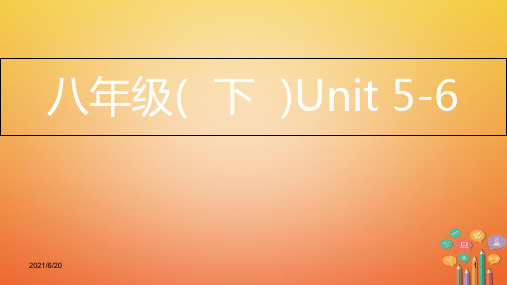
用 2.表达观点
语 —So what do you think about the story of Yu Gong?
—I think it’s really interesting.
1.过去进行时
When yቤተ መጻሕፍቲ ባይዱu called,I was taking a shower.
语 We were eating dinner in the kitchen when we heard the news on the radio.
点 3.While Linda was sleeping,Jenny was helping Mary with her homework.
句 型
4.To fight bad people,the Monkey King uses a magic stick. 5.The mice knew that unless they helped her make a dress,she would not be able to go to the party.
重点单词 重点短语 重点句型
考点1 辨析beat,win,fail和lose
Ben was helping his mom make dinner when the rain began to beat heavily against the windows.当雨使劲敲击着窗户的时候,本正在帮 妈妈做晚饭。( P35 ) 1.beat为动词,意为“打败,战胜,超过”。常用搭配:beat sb.at/in sth.“在 某事上战胜某人”。win意为“赢,胜利”,后面的宾语一般是奖品、比 赛、辩论、选举、战斗等名词。例如: 1 )He beat me at chess.他下棋赢了我。 2 )He beat me in the race.他在赛跑中赢了我。 3 )We are looking forward to winning the match tonight.我们期待今 晚能赢得比赛。
人教版新目标八年级下册英语unit1-5期中复习提纲
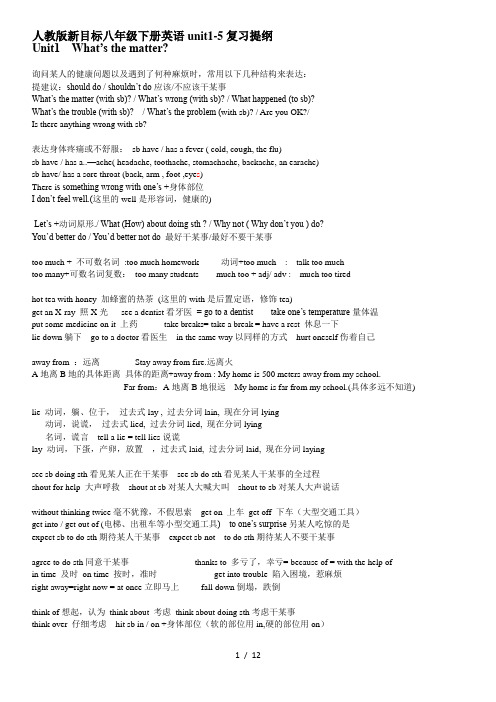
人教版新目标八年级下册英语unit1-5复习提纲U nit1 What’s the matter?询问某人的健康问题以及遇到了何种麻烦时,常用以下几种结构来表达:提建议:should do / shouldn’t do应该/不应该干某事What’s the matter (with sb)? / What’s wrong (with sb)? / What happened (to sb)?What’s the trouble (with sb)? / What’s the problem (with sb)? / Are you OK?/Is there anything wrong with sb?表达身体疼痛或不舒服:sb have / has a fever ( cold, cough, the flu)sb have / has a..—ache( headache, toothache, stomachache, backache, an earache)sb have/ has a sore throat (back, arm , foot ,eye s)There i s something wrong with one’s +身体部位I don’t feel well.(这里的well是形容词,健康的)Let’s +动词原形./ What (How) about doing sth ? / Why not ( Why don’t you ) do?You’d better do / You’d better not do 最好干某事/最好不要干某事too much + 不可数名词:too much homework 动词+too much : talk too muchtoo many+可数名词复数:too many students much too + adj/ adv : much too tiredhot tea with honey 加蜂蜜的热茶(这里的with是后置定语,修饰tea)get an X-ray 照X光see a dentist看牙医= go to a dentist take one’s temperature量体温put some medicine on it 上药take breaks= take a break = have a rest 休息一下lie down躺下go to a doctor看医生in the same way以同样的方式hurt oneself伤着自己away from :远离Stay away from fire.远离火A地离B地的具体距离具体的距离+away from : My home is 500 meters away from my school.Far from:A地离B地很远My home is far from my school.(具体多远不知道)lie 动词,躺、位于,过去式lay , 过去分词lain, 现在分词lying动词,说谎,过去式lied, 过去分词lied, 现在分词lying名词,谎言tell a lie = tell lies说谎lay 动词,下蛋,产卵,放置,过去式laid, 过去分词laid, 现在分词layingsee sb doing sth看见某人正在干某事see sb do sth看见某人干某事的全过程shout for help 大声呼救shout at sb对某人大喊大叫shout to sb对某人大声说话without thinking twice毫不犹豫,不假思索get on 上车get off 下车(大型交通工具)get into / get out of (电梯、出租车等小型交通工具) to one’s surprise另某人吃惊的是expect sb to do sth期待某人干某事expect sb not to do sth期待某人不要干某事agree to do sth同意干某事thanks to 多亏了,幸亏= because of = with the help ofin time 及时on time 按时,准时get into trouble 陷入困境,惹麻烦right away=right now = at once立即马上fall down倒塌,跌倒think of想起,认为think about 考虑think about doing sth考虑干某事think over 仔细考虑hit sb in / on +身体部位(软的部位用in,硬的部位用on)run it under water用水冲洗put a bandage on it 用绷带包扎Knives are used to cut things.sick& illsick 形容词,可作定语,修饰名词,如:a sick girl ; 也可作表语,如:She is sick.ill形容词,一般只作表语,不做定语She is ill. ( ill作定语修饰名词,指坏的=bad)have trouble (in) doing sth = have problems/difficulty (in) doing sth干某事有麻烦/问题/ 困难have trouble with sth= have problems with sth = have difficulty with sth在某方面有困难be / get used to doing sth 习惯于干某事I am used to getting up early.我习惯了早起used to do sth过去常常干某事(暗示现在不干了)I used to get up early. (暗示现在不早起)be used to do sth被用来干某事(是由use sth to do sth变为被动语态而来)look up 查阅,查字典write down 写下,记下take a risk = take risks 冒险risk用作动词:risk + n / 代/ doing sthI am willing to risk losing everything.because of +名词或名词性短语because of accidents lose one’s life 失去生命in a dangerous situation在危险的情况下by oneself 独自,亲自free 形容词,自由的,空闲的,免费的:Are you free? / The flower is for free. 花是免费的动词,解放,使自由I want to free these birds in cages.run out 用完,耗尽,物作主语,即sth run out: My money ran out soon.run out of 用完,耗尽,=use up 人作主语,即sb run out of sth: I ran out of my money soon.use sth to do sth使用某物来干某事cut off切断climb down爬下be ready to do sth = get ready to do sth准备好干某事be ready for sth = get ready for sth为…做好准备with his left arm用他的左胳膊,with 用(用工具) We eat with chopsticks.我们用筷子吃饭。
新目标英语八下unit1-5notes全文版

新目标英语八下unit1-5notes全文版Unit 1 What’s the matter?1.……26路公交车正行驶在中华路上,这时司机看到一位老人躺在路边。
…bus No.26 was going along Zhonghua Road when the driver saw an old man lying on the side of the road.2.我正要冲澡,就在这个时候电话响了起来。
I was just getting into the shower when the telephone rang.3.他们进去的时候,看到一些孩子正在花园里高兴地玩耍。
When they went in, they saw some children playing happily in the garden.4.我们看见他独自站在那里,不知做什么是好。
We saw him standing there alone, not knowing what to do.5.公交司机……没有多想便停下了车。
The bus driver… stopped the bus without thinking twice.6.在我们做出这个决定之前,必须认真思考!We must think twice before we make this decision!7.好好想想,也许你会改变主意的。
Think twice about it. Maybe you’ll change your mind.8.多亏了王先生和乘客们,医生及时挽救了老人的生命。
Thanks to Mr. Wang and the passengers, the doctors waved the man in time.9.如今多亏有了互联网,你在家里就能买到你所要买的东西了。
Today, thanks to the Internet, you can do all your shopping from home.10.因为你们的节目,我们方能相互认识。
人教新目标英语八年级下册Unit-4---5重难点知识复习

重难点知识复习Unit 4 Why don’t you talk to your parents?一.词型转换。
relation n.关系----relationship n.关系communicate v.交流-----communication n.交流argue v.争执---- argument n.争执cloud n云--- cloudy adj.多云的proper adj.合适的---- properly adv.合适地explain v.解释---- explanation n.解释clear adj.清楚的--- clearly adv.清楚地press v.按、压---- pressure n.压力compete v.竞争--- competition n.竞赛quick adj.快的--- quickly adv. 快地develop v.发展--- development n.发展usual adj.普遍的--- usually adv.通常unusual adj.不寻常的二、重点短语1. have free time to do sth有空闲时间2. allow sb. to do sth. 允许某人做某事allow doing sth 允许做某事be allowed to do sth 被允许做某事3. hang out with sb. 与某人闲逛4. have \ take after-school classes课外活动课5. get into a fight with sb. 与某人吵架/打架fight with与某人吵架/打架have a fight with sb 与某人吵架/打架6. until midnight直到半夜7. talk to sb. 与某人交谈8. wait that long 等太久9. study too much学得过多10. get enough sleep有足够的睡眠11. write sb. a letter给某人写信12. talk about sth on the phone在电话上交谈某事13. surprise sb. 令某人惊讶14. look through翻看15. be angry with sb. 生某人的气16. a big deal重要的事deal with sth.处理某事17. work out成功地发展;解决18. get on\along with和睦相处;关系良:19. fight a lot经常吵架/打架20. hang over笼罩21. refuse to do sth. 拒绝做某事22. offer to do sth. 主动提出做某事23. so that以便24. mind sb. doing sth. 介意某人做某事25. all the time一直26. in future今后27. make sb. angry使某人生气28. worry about sth. 担心某事29. copy one’s homework抄袭某人的作业30. be oneself做自己31. family members 家庭成员32. spend time alone独自消磨时光33. give sb. pressure给某人施压34. argue with sb\have an argument with sb.与某人吵架35. compete with sb. 与某人竞争36. free time activities业余活动37. get better grades取得更好的成绩38. give one’s opinion提出某人的观点in one’s opinion 在某人看来39. learn exam skills学习应试技巧40. all kinds of 各种各样的a kind of 一种kind of +adj.有点41. cause stress造成压力42. cut out删除43.be nice to sb 对。
英语新目标八下Unit5period1精心准备
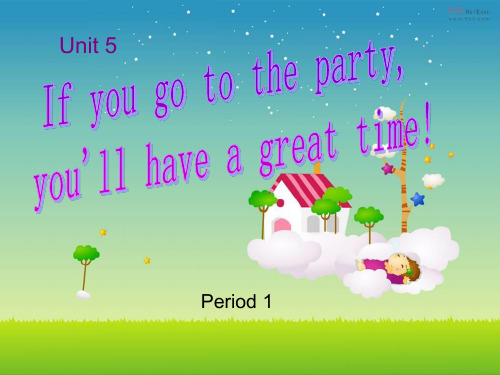
If you do, I won’t let you in. take the bus I will ______ to the party. If you do, you won’t be late.
1b Listen. Were your answers to activity 1a correct? 1. I think I’m going to go to the party with Karen and Ann. 2. I think I’m going to wear jeans to the party. 3. I think I’m going to take the bus to the party. 4. I think I’m going to stay at home.
If she calls my parents, my parents will be mad at me.
If my parents are mad at me,I won’t get any pocket money
If I can’t get any pocket money,I won’t buy the things I like.
I’ll go fishing .
If it is sunny tomorrow,
I think I will stay at home. (Be bored)
If it is sunny this Sunday
人教版八年级英语下册1-5单元知识点归纳
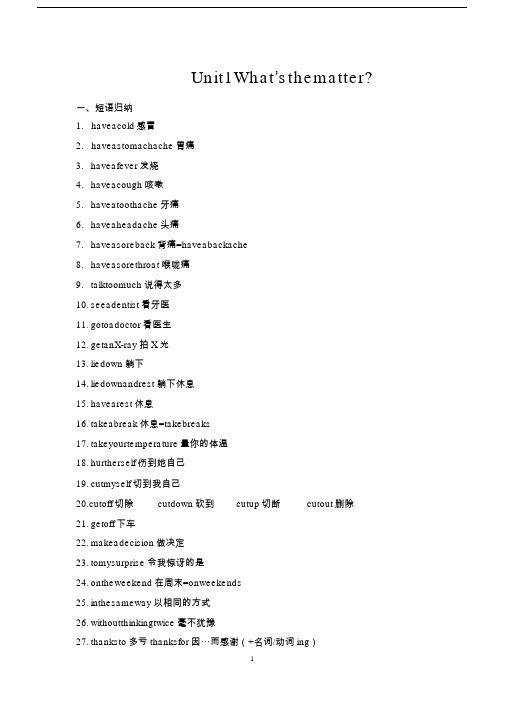
Unit1What’sthematter?一、短语归纳1.haveacold感冒2.haveastomachache胃痛3.haveafever发烧4.haveacough咳嗽5.haveatoothache牙痛6.haveaheadache头痛7.haveasoreback背痛=haveabackache8.haveasorethroat喉咙痛9.talktoomuch说得太多10.seeadentist看牙医11.gotoadoctor看医生12.getanX-ray拍X光13.liedown躺下14.liedownandrest躺下休息15.havearest休息16.takeabreak休息=takebreaks17.takeyourtemperature量你的体温18.hurtherself伤到她自己19.cutmyself切到我自己20.cutoff切除cutdown砍到cutup切断cutout删除21.getoff下车22.makeadecision做决定23.tomysurprise令我惊讶的是24.ontheweekend在周末=onweekends25.inthesameway以相同的方式26.withoutthinkingtwice毫不犹豫27.thanksto多亏thanksfor因⋯而感谢(+名词/动词ing)28.intime及时ontime按时29.savealife挽救生命30.getintotrouble陷入麻烦31.rightaway马上32.falldown跌倒33.waitfor等待34.beinterestedindoingsth.对做某事感兴趣35.giveup放弃二、用法集萃1.询问有什么病或有什么麻烦:What’sthematter(withsb.)?2.疾病的表达:have/hasa+疾病名称3.太多:toomuch+不可数名词;toomany+可数名词复数形式太:muchtoo+形容词4. enough足够的:①形容词+enough②enough+名词③itisenough+todosth.5. lie躺下过去式:lay现在分词:lying6.seesb.doingsth.看见某人正在做某事(正在进行)seesb.dosth.看见某人做了某事(看见动作的全过程)7.expecttodosth.期望做某事8.needtodosth.需要做某事9.helpsb.(to)dosth.帮助某人做某事10.tellsb.(not)todosth.告诉某人(不要)做某事11.asksb.todosth.要求某人做某事12.wanttodosth.想要做某事13.agreetodosth同.意做某事disagreetodosth.不同意做某事agreewithsb.同意某人的意见14.trouble问题;麻烦havetrouble/problemdoingsth.做某事有困难15.介词+doing常见的介词有:at;for;with;without;inabout16.be/getusedtodoingsth.习惯于做某事17.keepondoingsth.继续做某事18.minddoingtsh.介意做某事19.反身代词:myself我自己yourself你自己himself他自己herself她自己itself它自己复数:ourselves我们自己yourselves你们自己themselves他们自己20.knife-knives刀名词复数规则变化:①一般情况+s②以e结尾+s③以s、x、ch、sh结尾+es④以辅音字母+y结尾,变y为i+es⑤以o结尾,有生命+es;无生命+s⑥以f/fe结尾,变f/fe为v+es不规则变化:foot-feet脚、足tooth-teeth牙齿man-men男人woman-women女人mouse-mice老鼠21.important重要的importance重要性different不同的difference差异性22.death死亡(名词)die死(动词)dead死的(形容词)三、书面表达Howtokeephealthy如何保持健康Healthisimportant.Everyonewantstobehealthy.Letmetellyouhowtokeephealthy.Firstofall,weshouldeathealthyfood.Weshouldeatmorevegetablesandfruit.Wealson eedtodrinkmilk.Secondly,weshouldexercisealot.Weshoulddosomesportsafterschool.Finally,weshouldhaveenoughsleep.Tohaveagoodrest,weshouldgotobedearlyandgetupearly.Ithinkitisimportantforustokeephealthy.3Unit2I’llhelptocleanupthecityparks.一、短语归纳1. cleanup打扫干净cheerup使兴起来代词放中间2.giveout分发3.handout分发eupwith想出;提出(idea、plan等)5. putoff推迟puton穿衣服putup张贴putaway把⋯收好6.callup打电话;征召edtodosth.曾经做某事beusedtodingsth习.惯于做某事8. lonely孤独的(常用于feel之后)alone独自一人9.carefor照顾=takecareof10.afeelingofsatisfaction一种满足感11.tryout参加⋯选拔12.raisemoney募捐13.fixup修理14.giveaway赠送(money、oldclothes/books等)giveup放弃15.takeafter(外貌或行为)像16.besimilarto与⋯相似17.setup建立18.makeadifference影响;有作用19.disabledpeople残疾人20.makeaplan制定计划21.oldpeople’shome养老院22.helpoutwithsth.帮助解决困难23.abooklover书迷24.attheageof在⋯岁时etrue实现(与dream连用)26.atthesametime同时27.homelesspeople无家可归的人28.beworriedabout为⋯而担心worryabout担心29.forexample例如30.runoutof用完31.not⋯anymore不再32.atonce立刻;马上=rightaway二、用法集萃1.volunteertodosth自愿做某事2. difficult困难的difficulty困难havedifficulty(in)doingsth.做某事有困难3.excited兴奋的(人作主语)exciting使人兴奋的(物作主语)口诀:人+ed物+ing4.疑问词(how,what,where)+todo5. decidetodosth.决定做某事名词形式:decision makeadecision做决定6.learntodosth.学习做某事7.agoodwaytodosth.做某事的好方法8.wouldliketodosth.=wanttodosth.想要做某事9.thankyouforsth./doingsth.因某事/做某事而感谢10.kind善良的kindness善意Unit3Couldyoupleasecleanyourroom?一、短语归纳1.dothedishes清洗餐具2.takeouttherubbish倒垃圾3.foldtheclothes叠衣服foldmy/your/hisclothes4.sweepthefloor扫地5.makethebed铺床makemy/your/hisbed6.cleanthelivingroom打扫客厅7.helpoutwithsth.帮助解决某事8.atleast至少eover过来;顺便来访10.infrontof在⋯前面11.takethedogforawalk遛狗12.allthetime一直13.assoonas一⋯就⋯14.insurprise惊讶地15.hangout闲逛16.dochores做家务17.awasteoftime浪费时间18.inorderto为了19.getgoodgrades取得好成绩20.dependon依靠21.takecareof=carefor=lookafter照顾22.asaresult结果23.fallill生病二、用法集萃1.finishdoingsth.完成做某事2.if如果(主将从现,if后为从句,用一般现在时);是否(位于动词之后)3.assoonas一⋯就⋯.主将从现,assoonas后为从句4.replyangrily生气地回答(副词修饰动词,一般位于动词之后)abeautifuldog一只漂亮的狗(形容词修饰,名词,位于名词前)口诀:形名动副5.beangrywithsb.生某人的气6.as+形容词原级+as和⋯一样7.neitherdidI我也没有neither+be动词/助动词(do/does/did)/情态动词+主语“主语也不⋯..”so+be动词/助动词(do/does/did)/情态动词+主语“主语也⋯”8.can-could可以can,could还可以表示请求,could比can更有礼貌肯定回答:Sure./Ofcourse./Noproblem./Yes,sure.否定回答:No,youcan’t./Sorry,Ican’t.9.asksb.todosth.要求某人做某事10.borrow⋯from⋯跟⋯借(借进来)lend⋯to⋯把⋯借给⋯.(借出去)11.invitesb.todosth.邀请某人做某事12.helpwithsth.helpsb.(to)dotsh.帮助做某事13.havetimetodosth.有时间做某事havenotimetodosth没.时间做某事14.letsb.dosth.让某人做某事15.makesb.dosth.让某人做某事16.spend花费人+spend+时间+onsth/doingsth在某事上花时间/花时间做某事cost花费物+cost+金钱$某物花了多少钱take(took)花费Ittakes/tooksb.+时间+todo.做某事花了某人多少时间payfor付费17.itis+adj(forsb.)+todosth.做某事对某人而言是⋯的18.fair公平的unfair不公平的fairness公平性19.doone’spartindoingsth.尽自己的职责做某事20.the+比较级,the+比较级越...越⋯比较级and比较级越⋯越⋯theearlier⋯thebetter越早越好betterandbetter越来越好Unit4Whydon’tyoutalktoyourparents?一、短语归纳1.talkto/withsb.与某人交谈talkaboutsth.谈论某事2.freetime空闲时间3.allowab.todosth.允许某人做某事allowdoingsth.允许做某事4.hangout闲逛5.getintoafight争吵;打架6.sothat为了;以便于7.lookthrough浏览;快速查看8.workout成功地发展;解决9.getonwith/getalongwith和睦相处municatewithsb.与某人交谈11.abigdeal重要的事petewithsb.与某人竞争13.examskills应试技巧14.cutout删除pare⋯with⋯比较16.not..until直到⋯才17.arguewithsb.与某人争吵18.noproblem没问题19.not..anymore不再20.inmyopinion依我看21.thanksfor因⋯而感谢22.allkindsof各种各样的23.worryabout为⋯而担心=beworriedabout二、用法集萃1.提建议句型:①Youshould/shouldn’t dosth.②How/Whataboutdoingsth.?③Whydon’tyoudosth.?④Whynotdosth.?⑤Shallwedosth.?⑥Let’sdosth.⑦You’dbetterdosth.⑧Wouldyouminddoingsth.?常见回答:Goodidea./Soundsinteresting./I’dliketo./Great.否定:I’dloveto,butIhaveto⋯/Sorry,Ican’t.2.beangrywithsb.生某人的气3. although/though虽然不与but连用4.advice建议(不可数名词)5.refusetodosth.拒绝做某事6.instead代替;反而(位于句首或句尾)insteadof代替(位于句中)7.offertohelp提供帮助8.minddoingsth.介意做某事9.continuetodo/doingath.继续做某事10.keepondoingsth.继续做某事11.afew一些(肯定)few一点点(否定)修饰可数名词复数形式alittle一些(肯定)little一点点(否定)修饰不可数名词做题步骤:先看横线后的名词,判断可数还是不可数;其次,理解句子表达的肯定还是否定12.it’s timeforsth.该做某事了=it’stimetodosth.pete竞争(动词)competition竞争(名词)14.havetimetodosth有.时间做某事Unit5Whatwereyoudoingwhentherainstormcame?一、短语归纳1.gooff闹钟发出响声2.rainheavily下大雨3.pickup接电话;采摘4.atfirst起先5.fallasleep进入梦乡6.diedown逐渐变弱7.havealook看一看8.makeone’sway费力地前进9.insilence沉默10.takedown拆除;往下拽;记录11.atthetimeof⋯当⋯.的时候12.waitfor等待13.atthattime在那时(一般过去时标志词)14.wakeup醒来15.goshopping去购物16.takeashower洗澡17.inamess乱七八糟18.forexample例如19.makesure确保二、用法集萃1.过去进行时定义:表示在过去某一时刻或某一时间段正在进行的动作。
人教版八年级下册Unit1-5 (期中)知识点归纳与总结

已排版好可直接打印使用巧思妙解提升思维能力Unit1-5知识点归纳与总结Unit1Where did you go on vacation?一、重点单词复合不定代词:(anyone,anywhere,something,nothing,everyone,someone);wonder,wonderful;反身代词:(myself;yourself);few;most;bored;decide;try;difference;enough;below,umbrella二、重点短语1.go on vacation去度假2.too many太多(后跟可数名词复数)3.quite a few相当多4.study for a test为考试学习5.taste good尝起来味道好6.have a good time=have fun玩得开心7.of course当然可以8.feel like感觉像……/想要9.something important重要的事情10.because of因为(+名词,代词或名词性词)11.most of the time大多数时间12.arrive in到达13.Long time no see好久不见14.keep a diary写日记15.go to the mountains去爬山16.go to the beach到海边去17.visit the museums参观博物馆18.go to summer camp去夏令营19.go out出去20.go shopping购物21.in the past在过去22.walk around四处走走23.one bowl of rice一碗米饭24.find out查出来/发现25.go on继续26.stay at home呆在家27.take photos照相28.up and down上上下下e up升起,出来三、习惯用法、搭配1.buy sth.for sb./buy sb.sth.为某人买某物(sb.某人;sth.某物)★2.taste+adj.尝起来……(adj.形容词)3.arrive in+大地方/arrive at+小地方到达某地★4.decide to do sth.决定做某事(to do表示动词不定式,就是在动词原形前加to)★5.try doing sth.尝试做某事/try to do sth.尽力做某事6.enjoy doing sth.喜欢做某事7.want to do sth.想去做某事8.start doing sth.=start to do sth开始做某事9.stop doing sth.停止做某事10.look+adj看起来11.dislike doing sth.不喜欢做某事12.Why not do sth.?=Why don’t you do sth?为什么不做…….呢?13.so+adj+that+从句如此……以至于……★14.tell sb.(not)to do sth.告诉某人(不要)做某事15.keep doing sth.继续/不停做某事16.★16.forget to do sth.忘记去做某事/forget doing sth忘记做过某事四、重点句子--Where did you go on vacation?你到哪里去度假了?---I went to New York City.我去了纽约城--Did you go out with anyone?你和他人出去的吗?--No,No one was here.Everyone was on vacation.不,没有人在这儿。
新目标英语 八年级下册 Unit1-10单元 重点短语+句型
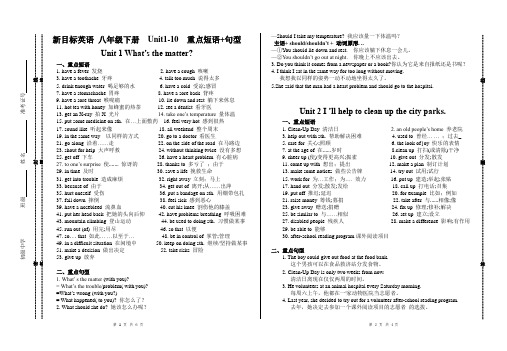
初级中学 班级 姓名 准考证号……………………………密……………………………………………………封…………………………………………线……………………… ……………………………答……………………………………………………题…………………………………………线……………………………………………………答……………………………………………………题…………………………………………线………………………新目标英语 八年级下册 Unit1-10 重点短语+句型Unit 1 What’s the matter?一、重点短语1. have a fever 发烧2. have a cough 咳嗽3. have a toothache 牙疼4. talk too much 说得太多5. drink enough water 喝足够的水6. have a cold 受凉;感冒7. have a stomachache 胃疼8. have a sore back 背疼9. have a sore throat 喉咙痛 10. lie down and rest 躺下来休息 11. hot tea with honey 加蜂蜜的热茶 12. see a dentist 看牙医13. get an X-ray 拍X 光片 14. take one’s temperature 量体温 15. put some medicine on sth. 在…上面敷药 16. feel very hot 感到很热 17. sound like 听起来像 18. all weekend 整个周末 19. in the same way 以同样的方式 20. go to a doctor 看医生21. go along 沿着……走 22. on the side of the road 在马路边 23. shout for help 大声呼救 24. without thinking twice 没有多想 25. get off 下车 26. have a heart problem 有心脏病 27. to one’s surprise 使....... 惊讶的 28. thanks to 多亏了 ;由于 29. in time 及时 30. save a life 挽救生命 31. get into trouble 造成麻烦 32. right away 立刻;马上 33. because of 由于 34. get out of 离开;从……出萍35. hurt oneself 受伤 36. put a bandage on sth. 用绷带包扎 37. fall down 摔倒 38. feel sick 感到恶心39. have a nosebleed 流鼻血 40. cut his knee 割伤他的膝盖41. put her head back 把她的头向后仰 42. have problems breathing 呼吸困难 43. mountain climbing 登山运动 44. be used to doing sth. 习惯做某事 45. run out (of) 用完;用尽 46. so that 以便47. so. . . that 如此… …以至于… 48. be in control of 掌管;管理49. in a difficult situation 在闲境中 50. keep on doing sth. 继续/坚持做某事 51. make a decision 做出决定 52. take risks 冒险 53. give up 放弃二、重点句型1. What’ s the matter (with you)?= What’s the trouble /problem( with you)? =What ’s wrong (with you?)= What happened( to you)? 你怎么了? 2. What should she do? 她该怎么办呢?—Should I take my temperature? 我应该量一下体温吗? 主语+ should/shouldn’t + 动词原形. ..—①You should lie down and rest. 你应该躺下休息一会儿。
新目标八年级下册英语Unit1单元归纳及练习

Unit1单元短语词性练习1.important(adj)重要的--importance(n)重要短语:the importance of:……的重要性He always tells of the________________(重要性)of learning English.2.health(n)健康--healthy(adj)健康的—healthily(adv)健康地短语:keep healthy=be in good healthIf you are too thin, try to eat______________(health)food to make yourself better.3.decide(v)决定—decision(n)短语:decide to do sth 决定做某事;make a decision :做一个决定;make decisions:做决定I decide_______________ (finish)my homework.I want to know if you can make______________(决定)foryourselves.4.agree(v)同意--agreement(n)短语:agree to do sth 同意做做某事;agree with sb 同意某人;agree on sth :在某事上达成一致They both agreed__________________(go) hiking with me in the mountains.But to his surprise, they all agreed______________(go)with him.5.want:(v)想要短语:want sth:想要某事;want to do sth = would like to do sth=feel like doing sth 想要做某事want sb to do sth:想要某人做某事The Smith wanted_______________(live) in China.6.die(v)死亡--dead(adj)死的-- dying(adj)奄奄一息的--death(n) 死亡Stephen Hawking was born on January 8th 1942,and______________(die)on March 14th,2018.The cat’s__________(die) made my grandma sad.He is not ready ______________(death)that day.My son is facing_____________(死亡)while you are keeping him waiting.7.with(prep)有--without(prep)没有短语:without doing sthI think I sat in the same way for too long without________________(move)The bus driver,24-year-old Wang Ping, stopped the bus without______________(think) twice.8.see(v)看见-- saw(过去式)短语:see sb doing sth 看见某人正在做某事;see sb do sth看见某人做了某事On my way home, I saw an old man___________(lie) on the ground and I helped him.The driver saw an old man______________(lie)on the ground.9.danger(n)危险--dangerous (adj)危险的短语:be in (great )danger:处于(极大的)危险之中He was in great ______________(dangerous).e(v)使用--useful(adj)有用的短语:use sth to do sth :使用某物来做某事;be used to doing sth;习惯做某事We use knives________________(cut) things.He is used to_______________________(read)books every day.My grandmother is used to______________(exercising) in the morning.12.s urprise(n)惊奇--surprising(adj修饰物)--surprised(adj修饰人)短语:to one’s surprise 另某人惊讶的是;be surprised to do sth 对做某事感到惊讶I an surprised ___________________(hear)you say that.To our _________(惊奇),the boy won the first prize in the singing competition.13 反身代词短语:hurt oneself :受伤;cut oneself:把自己弄伤;teach oneself=learn it by oneself自学by oneself:亲自,独自;enjoy oneself:玩得愉快;look after oneself=take care of oneself照顾自己help oneself to:请随意……My mother is good at cooking and she learn it by______________.(she)Lily,help_________(you)to some fruit.We had a big meal at the party and enjoyed__________________(we)He can look after__________________(he).Boys and girls,please help_______________(you)to some cakes.She hurt___________(she) just now.He cut_____________(he) yesterday.13.名词单复数变化:foot--feet脚tooth--teeth牙齿man--men男人Woman--women sheep--sheep羊群deer--deer鹿Chinese---Chinese中国人Japanese--Japanese日本人名词以fe或f结尾,去掉fe或f,加ves刀:knife--knives ;妻子:wife--wives ;生命:life-lives;一半:half--halves叶子:leaf--leaves ;小偷:thief--thieves ;狼:wolf--wolves; 围巾:scarf--scarves/scarfs注意: a lot of/lots of/some/many/several/数字大于等于2/one of/both/these/those/few/ a few/hundreds of/thousands of/are/were/+可数名词复数A desk has four________(foot).Nick hut his both________(膝盖)while running.We use________(knife0 to cut things.Lots of______________(乘客)get off the bus at he bus station.词形变换1.foot n. 脚;足→(复数形式)2.lie v. 躺;平躺→(过去式)→(动名词形式)3.cough v.&n.咳嗽→(第三人称单数形式)4.break n.间歇;休息→(v.打破)→(过去式)5.hurt v.(使)疼痛;受伤→(过去式)6.hit v.(用手或器具)击;打→(过去式)→(动名词形式)7.herself pron.她自己→(形容词性物主代词)→(人称代词宾格)8.press v.压;挤;按→(第三人称单数形式)9.ourselves pron.我们自己→(形容词性物主代词)10.climber n.登山者;攀登者→(v.爬)11.kilo n.千克;公斤→(复数形式)12.knife n.刀→(复数形式)13.mean v.意思是;打算;意欲→(n.意思)→(adj.无意义的)→(adj.有意义的)14.importance n.重要性;重要→(adj.重要的)15.decision n.决定;抉择→(v.决定)16.death n.死;死亡→(v.死亡)→(动名词形式)试题精编一、根据句意及汉语提示完成句子1.You can tell me about your (苦恼). Maybe I can give you some advice.2.My mother helped me move the heavy box (向) the desk.3.There are too many (乘客) on the bus, so it is very crowded.4.Jack (伤害) his leg when he fell off the bike.5.Some students go to school on empty (肚子) because they have no time for breakfast.6.Ms.Brown had a sore (喉咙) after speaking for 2 hours.7.Good speakers of English change the way they talk in different (情况).8.Students should not take (刀) to school.9.Please put some medicine on the (晒伤的)part with a cotton swab(棉签).10.He and his two friends were climbing a (岩石) when they heard cries for help.二、用所给词的适当形式填空1.Making a good (decide) is very important for teenagers.2.My pet dog’s (die) made me very sad.3.The cat (lie) in front of the fire and fell asleep.4.Your (foot) are parts of your body. You stand on them.5.There are too many students (cough) in our class today.6.We often play basketball to relax (we) after school.7.Giraffes are very tall and they have very long (neck).8.The book tells us the (important) of education.9.I’d like two (kilo) of apples, please.10.When we got to the top, we had some trouble (breathe).三、用方框中所给单词或短语的适当形式填空A1.The had a rest halfway up the mountain because they felt tired.2.The man stayed in hospital for a week.3.With the help of doctors and , he could stand up again.4.I’m too tired. I need to have a good .5.On October 18, 2019 in Zhejiang, a car the fence and caused a big fire because the driver was drunk.B6.Tom was so tired that he and fell asleep quickly.7.My uncle is a supermarket in the city center.8.We must act as quickly as possible because time is .9.Grandpa drinking a cup of tea after breakfast.10.She decided to her job and start a coffee shop.四、根据汉语提示完成短文Many boys like ball games,especially football and basketball. However,I never like ball games because I am afraid of accidents. While I am playing, I may be 1 (撞)by the ball or hurt my 2(膝盖)if I run too much. I like reading booksquietly in the classroom during 3(间歇). But one day an 4(意外) happened while I was reading. I was turning pages at that time when suddenly the edge of the paper 5 (切) me. There was 6(血) on my finger.I felt worried and thought whether I should put a 7(绷带)around it. Then the school doctor said it didn’t8(要紧),and I only need to put my finger through the running water. I would be fine in a moment. Then I realized that we couldn’t avoid accidents or 9 (风险). What we should do is to learn to treat them in a right way and keep our 10 (精神) up.五、语法填空阅读下面短文,在空白处填入一个适当的词,或填入括号中所给单词的正确形式。
新目标八年级下英语全册复习提纲
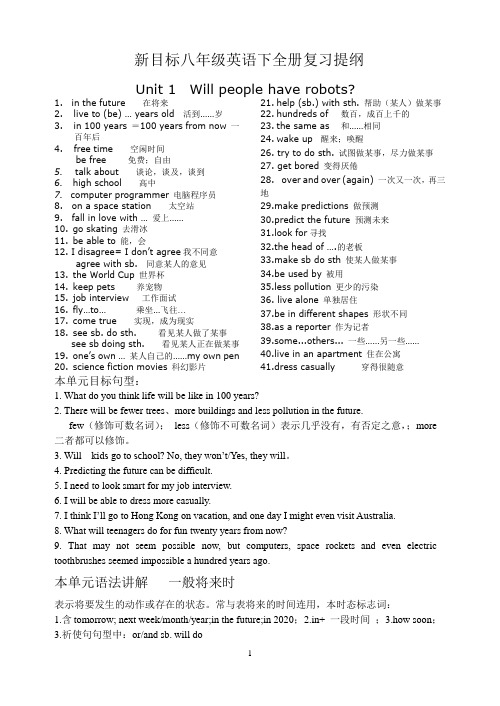
新目标八年级英语下全册复习提纲Unit 1 Will people have robots?1.in the future 在将来2.live to (be) … years old 活到……岁3.in 100 years =100 years from now 一百年后4.free time 空闲时间be free 免费;自由5.talk about 谈论,谈及,谈到6.high school 高中puter programmer 电脑程序员8. on a space station 太空站9. fall in love with … 爱上……10.go skating 去滑冰11.be able to 能,会12. I disagree= I don’t agree我不同意agree with sb. 同意某人的意见13.the World Cup 世界杯14.keep pets 养宠物15.job interview 工作面试16.fly…to… 乘坐…飞往…e true 实现,成为现实18.see sb. do sth. 看见某人做了某事see sb doing sth. 看见某人正在做某事19.one’s own … 某人自己的……my own pen20.science fiction movies 科幻影片21.help (sb.) with sth. 帮助(某人)做某事22.hundreds of 数百,成百上千的23.the same as 和……相同24.wake up 醒来;唤醒26. try to do sth. 试图做某事,尽力做某事27. get bored 变得厌倦28. over and over (again) 一次又一次,再三地29.make predictions 做预测30.predict the future 预测未来31.look for寻找32.the head of ….的老板33.make sb do sth 使某人做某事34.be used by 被用35.less pollution 更少的污染36. live alone 单独居住37.be in different shapes 形状不同38.as a reporter 作为记者39.some...others... 一些……另一些……40.live in an apartment 住在公寓41.dress casually 穿得很随意本单元目标句型:1. What do you think life will be like in 100 years?2. There will be fewer trees、more buildings and less pollution in the future.few(修饰可数名词);less(修饰不可数名词)表示几乎没有,有否定之意,;more 二者都可以修饰。
- 1、下载文档前请自行甄别文档内容的完整性,平台不提供额外的编辑、内容补充、找答案等附加服务。
- 2、"仅部分预览"的文档,不可在线预览部分如存在完整性等问题,可反馈申请退款(可完整预览的文档不适用该条件!)。
- 3、如文档侵犯您的权益,请联系客服反馈,我们会尽快为您处理(人工客服工作时间:9:00-18:30)。
Review of units 1-5Unit 1Useful Expressions1.make predictions 做预测2.free time 空闲时间3.fly…to…乘坐…飞往…4.on a space station 在太空站上5.I disagree. 我不同意.6.fall/be in love with sb. 与sb.相爱7.keep pets 养宠物8.be able to 能够9.predict the future 预测未来e true 实现11.see sb. do sth. 看见sb.做某事(的全过程)doing sth. 看见sb.正在做某事(片断)12.help sb. with sth. 帮助某人做某事13.hundreds of 数以百计的14.try to do sth. 尽力做某事15.look like 看上去长的像…16.look for 寻找17.一段时间+ from now (从现在起)…之后from now on = in the future 今后Key Points1.Do you think …?I think (that)….I don’t think (that)….2. study at home on computer辨析:on,in和with.on:表示使用通讯工具、信息或传媒,乘坐交通工具等; in:使用语言文字等媒介;with:借助具体的手段或工具。
Eg. I don’t want to talk about it on the phone.Can you speak it in English?Don’t write it with a red pen.3. Will people use money in 100 years?“in+时间”结构常与一般将来时连用,对其进行提问时用特殊疑问词how soon.4. beforeago 与过去时连用Grammar Focus1. The Simple Future tense一般将来时的三种基本结构:⑴will +V.⑵be going to +V.⑶be + Ving一般将来时的时间状语:in + 时间,in the future,next + 时间,与tomorrow 相关的时间,this + 时间,from now on,right now,some day…2.形容词、副词的比较级用法Unit 2UE1. argue with sb. 与某人争吵about/over sth. 为某事争吵2.out of style/danger 过时/脱离险境in style/danger 时尚/处于危险之中3.call up sb. (代词放中间)给某人打电话4.keep out 不让…进入5.What’s wrong? 怎么啦?6.be surprised at …对…感到吃惊7.borrow sth. from sb. 从某人那里借入某物8.need to do sth. (某人)需要做某事doing sth. (某物)需要做某事9.pay … for sth. 为某物付…(钱)10.the same + n. + as…与…一样的n.11.get on well with sb. 与某人相处融洽12.have a fight with sb. 与某人争吵13.take part in 加入14.plan sth. for sb. 为某人计划某事15.as much as possible 尽可能多的…KP.1. Sb. pay …for sth. 某人为某物花了…钱。
Sth. cost sb. …某物花了某人…钱。
Sb. spend …on sth. 某人花了…(时间、金钱)在某事上。
(in) doing sth. 某人花了…(时间、金钱)做某事。
It takes/took sb. … to do sth. 花了某人…(时间、金钱)做某事。
2. not … until 直到…才…(主句动词是短暂性动词)until 一直到…(主句中使用延续性动词)3. leaveGF情态动词1.情态动词没有人称和数的变化;2.情态动词不能直接做谓语,必须和一个动词原形同时使用;3.大多数情态动词没有时态的变化;4.情态动词加上be,通常表示猜测的语气。
Unit3UE1.in front of ---- behide 在…的前面---- 在…的后面in the front of ---- at the back of 在…的前部---- 在…的后部(包含在内)2.take off 起飞3.get out of 离开…4.You are kidding. 胡说八道5.follow sb. to do sth. 跟着某人做某事6.get into 进入7.shout at 训斥、责备shout to 向…喊叫8.What happen?发生什么事了?happen = take place 发生9.in silence 沉默地10.in space 在太空中11.at the doctor’s 在诊所12.jump down from…从…跳下13.climb up the tree 爬上树KP“as + 形容词/副词的原级+as”表示“和…一样”否定形式:“not as/so + 形容词/副词的原级+as”表示“和…不一样”GF1.The Past Progressive Tense过去进行时⑴用法:表示在过去某一时刻或某段时间内正在进行的动作。
⑵谓语结构:be ( was, were )+ Ving⑶时间状语:at that time/momentat + 点钟+ yesterday/last nightfrom +点钟+ to +点钟+ yesterdaythis time yesterdayjust thenwhen he came in, ….(when引导的时间状语从句是过去时,并且动词是短暂性动词时,主句使用过去进行时)2.when & whilewhen与while都是从属连词,都有“当……时”的意思。
when 可与一个点的时间或表示一段的时间连用,从句动词可以是短暂性或延续性动词;while 只指一段时间,不能指一点时间。
因此while从句中的谓语动词必须是延续性动词。
Unit 4UE1.have a surprise party 举办一个惊喜派对2.be mad at/with sb. for sth. 因为某事对某人发火be mad about/on sth./sb. 对某事/某人很着迷3.not … anymore = not … any more = no more 不再4.first of all 首先5.pass ( on ) sth. to sb. 把某物递给某人pass on (代词放中间)6.work on 从事7.be supposed to = should 应该8.be good/better/best at 擅长于…do well/better/best in9.report card 成绩单10.the disappointing result 令人失望的结果11.this semester 本学期12.How’s it going? 你好吗?How goes it?How are things going?13.be in good/poor/bad/ill health 健康状况好/不好/糟糕/病着14.end of year exams 期末考15.get/be nervous of sth./doing sth. 对某事/做某事感到紧张16.have a hard time with sth. 在某事上/做某事处境困难doing sth.17.It’s just that…这只是由于…18.forget to do sth. 忘记去做某事doing sth. 忘记做过某事19.get over 克服20.for now 至今为止21.open up 打开22.care for 照顾KP1.true 符合客观事实的(人和事)really 真实存在的(人和事)2.be sure that 确信…3.I don’t think (that)…我不认为…(否定前置)GF1.The object clause宾语从句⑴引导词:that ——引导陈述句,在句中可省略;if,whether ——引导一般疑问句,可相互替换(从句中出现or not时只能使用whether);wh-,h- ——引导特殊疑问句。
⑵时态:注意:从句讲述的是客观真理时,不根据主句改变时态。
⑶语序:引导词后加陈述句语序“主句+ 引导词+ 从句主语+ 从句谓语+ 其他”2.Direct Speech and Reported Speech直接引语变为间接引语时参照宾语从句的变法,把双引号内的句子变为宾语从句即可。
以下是另需变化的两点⑷人称和所有格:“一主,二宾,三不变”⑸状语与动词Unit 5UE1.have a great time 过得很愉快2.wear jeans 穿牛仔裤3.let sb. in/out/by 让某人进来/出去/过去4.be late for 迟到5.be sorry (that)…感到遗憾anize sth. for …为…组织某事7.half (of) the class 半班8.take away…把…拿走、没收bring sth. to …把某物带来…take sth. from …从…把某物带走9.Why not? 为什么不呢?10.clean up 收拾干净11.make a lot of money 挣许多钱12.be famous for…因…而出名be famous as…因作为…而出名13.join = take part in 参加14.a professional athlete 职业运动员15.get injured 受伤16.a great chance 一次好机会17.all the time 一直18.around the world = all over the world 全世界19.make a living (by) doing sth. 做某事谋生plain about sth. 抱怨某事21.decide to do sth. 决定去做某事22.in order to do sth. 以便、为了that + 目的状语从句= so that in order 整齐、有条理、正常23.talk on the phone 讲电话KP1.too much + 不可数名词too many + 可数名词much too + 形容词2.against 反对、与…相反、与…对抗argue against 抵制GF1.The Conditional Adverbial Clause条件状语从句由if或unless引导,表示如果有从句中的动作发生,就会有主句的动作发生。
